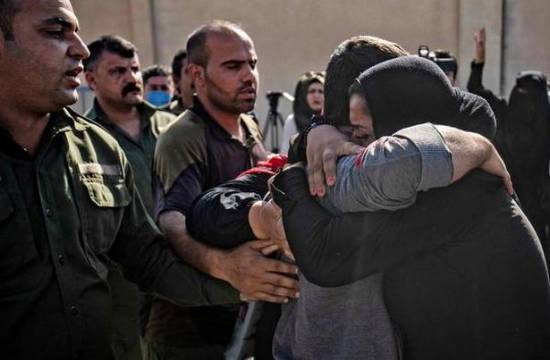Kurdish-led authorities free hundreds of Islamic State militants jailed in northern Syria
Kurdish-led authorities in northeast Syria have freed hundreds of imprisoned Islamic State militants, saying they have "no blood on their hands" and have repented joining the terrorist group.
A first batch of 631 Syrian IS prisoners was released on Thursday, while 253 had their sentences halved, according to Syrian Democratic Council co-chair Amina Omar.
The released were Syrian nationals accused of low-level membership in IS who were not thought to have been commanders or involved in attacks.
"This includes those convicted of terror charges whose hands are not stained with the blood of Syrians,” Ms Omar said at a press conference in the northeast city of Qamishli.
Following the territorial defeat of IS last March, the western-backed Syrian Democratic Forces were left holding some 19,000 ISIS-affiliated men and boys in detention in some two dozen detention facilities spread across northeast Syria.
Among the prisoners were about 12,000 Syrians, 5,000 Iraqis and 2,000 third country nationals, including about 800 Europeans, whose governments have failed to bring them home.
Under a new amnesty for prisoners announced by authorities on Monday, “low-ranking members will be released, subject to good behaviour”.
Only Syrians will be included in the amnesty, with authorities saying they are still committed to holding trials for foreign IS-affiliates in northeast Syria, which they hope the international coalition against IS will support by establishing an international court.
The amnesty was aimed at relieving overcrowding in prisons and improving relations with Syrian Arab communities, who have demanded the release of relatives.
“We saw the need for a general amnesty,” Ms Omar said, adding that authorities hoped it would “build bridges of trust and enhance participation in the Autonomous Administration of North and East Syria".
The amnesty follows an announcement earlier this month that authorities would free Syrian women and children from al-Hol camp, which holds nearly 70,000 people in overcrowded and unsanitary conditions.


